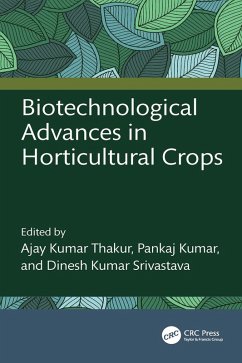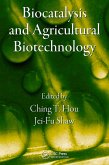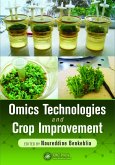Biotechnological Advances in Horticultural Crops (eBook, PDF)
Redaktion: Thakur, Ajay Kumar; Kumar Srivastava, Dinesh; Kumar, Pankaj
52,95 €
52,95 €
inkl. MwSt.
Sofort per Download lieferbar

26 °P sammeln
52,95 €
Als Download kaufen

52,95 €
inkl. MwSt.
Sofort per Download lieferbar

26 °P sammeln
Jetzt verschenken
Alle Infos zum eBook verschenken
52,95 €
inkl. MwSt.
Sofort per Download lieferbar
Alle Infos zum eBook verschenken

26 °P sammeln
Biotechnological Advances in Horticultural Crops (eBook, PDF)
Redaktion: Thakur, Ajay Kumar; Kumar Srivastava, Dinesh; Kumar, Pankaj
- Format: PDF
- Merkliste
- Auf die Merkliste
- Bewerten Bewerten
- Teilen
- Produkt teilen
- Produkterinnerung
- Produkterinnerung

Bitte loggen Sie sich zunächst in Ihr Kundenkonto ein oder registrieren Sie sich bei
bücher.de, um das eBook-Abo tolino select nutzen zu können.
Hier können Sie sich einloggen
Hier können Sie sich einloggen
Sie sind bereits eingeloggt. Klicken Sie auf 2. tolino select Abo, um fortzufahren.

Bitte loggen Sie sich zunächst in Ihr Kundenkonto ein oder registrieren Sie sich bei bücher.de, um das eBook-Abo tolino select nutzen zu können.
The field of Horticultural Biotechnology has witnessed remarkable growth in recent years, offering profound insights and innovations that are reshaping agriculture's future. " Biotechnological Advances in Horticultural Crops " serves as a comprehensive guide to the latest innovations and applications.
- Geräte: PC
- mit Kopierschutz
- eBook Hilfe
Andere Kunden interessierten sich auch für
![Biotechnological Advances in Horticultural Crops (eBook, ePUB) Biotechnological Advances in Horticultural Crops (eBook, ePUB)]() Biotechnological Advances in Horticultural Crops (eBook, ePUB)52,95 €
Biotechnological Advances in Horticultural Crops (eBook, ePUB)52,95 €![Applied Molecular Biotechnology (eBook, PDF) Applied Molecular Biotechnology (eBook, PDF)]() Applied Molecular Biotechnology (eBook, PDF)83,95 €
Applied Molecular Biotechnology (eBook, PDF)83,95 €![Biofuel from Microbes and Plants (eBook, PDF) Biofuel from Microbes and Plants (eBook, PDF)]() Biofuel from Microbes and Plants (eBook, PDF)54,95 €
Biofuel from Microbes and Plants (eBook, PDF)54,95 €![Biocatalysis and Agricultural Biotechnology (eBook, PDF) Biocatalysis and Agricultural Biotechnology (eBook, PDF)]() Biocatalysis and Agricultural Biotechnology (eBook, PDF)64,95 €
Biocatalysis and Agricultural Biotechnology (eBook, PDF)64,95 €![Antimicrobials in Agriculture (eBook, PDF) Antimicrobials in Agriculture (eBook, PDF)]() Antimicrobials in Agriculture (eBook, PDF)52,95 €
Antimicrobials in Agriculture (eBook, PDF)52,95 €![Omics Technologies and Crop Improvement (eBook, PDF) Omics Technologies and Crop Improvement (eBook, PDF)]() Omics Technologies and Crop Improvement (eBook, PDF)64,95 €
Omics Technologies and Crop Improvement (eBook, PDF)64,95 €![Diverse Applications of Nanotechnology in the Biological Sciences (eBook, PDF) Diverse Applications of Nanotechnology in the Biological Sciences (eBook, PDF)]() Diverse Applications of Nanotechnology in the Biological Sciences (eBook, PDF)136,95 €
Diverse Applications of Nanotechnology in the Biological Sciences (eBook, PDF)136,95 €-
-
-
The field of Horticultural Biotechnology has witnessed remarkable growth in recent years, offering profound insights and innovations that are reshaping agriculture's future. "Biotechnological Advances in Horticultural Crops" serves as a comprehensive guide to the latest innovations and applications.
Dieser Download kann aus rechtlichen Gründen nur mit Rechnungsadresse in A, B, BG, CY, CZ, D, DK, EW, E, FIN, F, GR, HR, H, IRL, I, LT, L, LR, M, NL, PL, P, R, S, SLO, SK ausgeliefert werden.
Produktdetails
- Produktdetails
- Verlag: Taylor & Francis eBooks
- Seitenzahl: 234
- Erscheinungstermin: 13. November 2024
- Englisch
- ISBN-13: 9781040164716
- Artikelnr.: 72286099
- Verlag: Taylor & Francis eBooks
- Seitenzahl: 234
- Erscheinungstermin: 13. November 2024
- Englisch
- ISBN-13: 9781040164716
- Artikelnr.: 72286099
- Herstellerkennzeichnung Die Herstellerinformationen sind derzeit nicht verfügbar.
Dr. Ajay Kumar Thakur has recently joined as Principal Scietist (Biotechnology) at ICAR-Central Potato Research Institute, Shimla, HP consequent upon his transfer from ICAR-Directorate of Rapeseed-Mustard Research, Bharatpur, Rajasthan. He has obtained his graduation, PG and Doctoral degrees from Dr. Y.S. Parmar University of Horticulture & Forestry, Solan, H.P. He got induced into Agricultural Research Services (ARS) in 2008. He has published 72 research/review papers in various journals of International and National repute, authored one book 'Agricultural Biotechnology at a Glance', edited three books, contributed 8 book chapters and 23 popular articles. He has developed high efficiency plant regeneration and genetic transformation protocols in a number of crops including Populus ciliata, P. deltoides, Punica granatum, Capsicum annum and Cucumis sativus. Dr. Thakur is associated with Brassica juncea improvement programme using biotechnological interventions from last fourteen years. He has developed a core set of SSR markers for B. juncea genomics and has worked on germplasm characterization and association mapping of various agronomically important traits in this oilseed crop. He has also been granted one patent from Indian Patent Office, New Delhi and associated in the development of two high yielding Indian mustard varieties Giriraj & Brajraj, one gobhi sarson variety, AKMS-8141 and five disease resistant Indian mustard genetic stocks. Dr. Thakur has received many awards from various societies and scientific organizations for his scientific contribution. He is also an elected Member of Plant Tissue Culture Association of India (PTCAI) and selected Member of National Academy of Sciences-India (NASI), Allahabad. Dr. Pankaj Kumar currently serves as an Assistant Professor in Biotechnology at the Department of Biotechnology, Dr. Yashwant Singh Parmar University of Horticulture and Forestry in Solan, Himachal Pradesh, India. His academic journey includes post-doctoral studies at the National Institute of Plant Genome Research in New Delhi and the Council of Scientific & Industrial Research - Institute of Himalayan Bioresource Technology in Palampur, Himachal Pradesh. Dr. Kumar boasts 12 years of expertise in horticulture biotechnology, focusing on plant secondary metabolite enhancement through cell and tissue engineering approaches. His research encompasses the identification of molecular cues associated with enhanced metabolites using a comparative transcriptomics approach. Additionally, he possesses experience in hydro-aero cultivation of medicinal plants for industrial significance. During Doctoral Studies; he (research team) has generated technology at Dr. Yashwant Singh Parmar University of Horticulture & Forestry Nauni, Solan for developing insect pest-resistant transgenic plants in economically important vegetable crops of cauliflower cv. Pusa Snowball, cabbage cv. Pride of India and broccoli cv. Solan Green Head (with cryIAa gene) for insect pest resistance. His accolades include the DST INSPIRE JRF/SRF Fellowship, ICAR AICE-SRF (PGS), and ICAR ASRB National Eligibility Test (NET). Dr. Kumar has an extensive publication record with more than 60 research/review papers, 23 book chapters, and 4 books. He has also filed an Indian patent and registered four apple mutants with unique, early color and early maturity characteristics in the Indian National Germplasm Repository (INGR 20103, INGR 20104, INGR 20105 & INGR 20106). Recognized for his scientific contributions, Dr. Kumar has received numerous awards, including the Young Scientists Fellowship Award-2021 (ICMR, New Delhi), Scientist's Pool Scheme Award-2020 (CSIR, New Delhi), and the SERB-ACS-NPDF Best Poster Award-2022, etc. Dr. D K Srivastava has retired as Director Extension Education, prior to this he worked as Professor and Head in the Department of Biotechnology, Dr. Yashwant Singh Parmar University of Horticulture and Forestry, Solan, Himachal Pradesh, India. He did his post-doctoral studies in the field of Plant Molecular Biology at the Institute of Molecular Genetics, USSR Academy of Sciences, Moscow, USSR and at Washington University, St. Louis, USA. He has 32 years of research experience and 29 years of teaching experience in the field of Plant Biotechnology and Molecular Biology. He had guided 32 students of M.Sc. and 9 students of Ph.D. for their research work. He has published 110 research papers in the journals of national and international repute, 38 research articles and contributed 12 chapters in the edited books, and also authored a book on biotechnology. He has delivered 45 invited lectures and attended 47 national and international conferences. His main area of research includes Plant tissue culture, Genetic transformation and Molecular characterization of plants. He is life member of various National and International Academic bodies/societies. He has received many awards for his scientific contributions including 'MS Swaminathan Award' by the Society of Plant Research, Meerut, India.
1 Plant Tissue Culture and Its Applications in Horticultural Crop
Improvement
2 Advances in Transgenic Approaches in Fruit and Vegetable Crops
3 Omics Sciences Advances in Tropical Fruits and Perspectives for Crop
Improvement
4 Prospects of Association Mapping for Important Traits in fruit crops
5 Improving Floral Attributes in Ornamental Crops by Biotechnological
Approaches
6 In Vitro Production of Some Underutilized and Unconventional
Horticultural Crops
7 Nanotechnology in Horticulture: Milestones and Advancements
8 Prospects of Microbial Diversity in Horticulture
9 Microbial Consortium as Biofertilizer and Biocontrol Agent for
Sustainable Agriculture
10 Scientific Validation and Techniques for Understanding Natural and
Organic Farming Perspective
Improvement
2 Advances in Transgenic Approaches in Fruit and Vegetable Crops
3 Omics Sciences Advances in Tropical Fruits and Perspectives for Crop
Improvement
4 Prospects of Association Mapping for Important Traits in fruit crops
5 Improving Floral Attributes in Ornamental Crops by Biotechnological
Approaches
6 In Vitro Production of Some Underutilized and Unconventional
Horticultural Crops
7 Nanotechnology in Horticulture: Milestones and Advancements
8 Prospects of Microbial Diversity in Horticulture
9 Microbial Consortium as Biofertilizer and Biocontrol Agent for
Sustainable Agriculture
10 Scientific Validation and Techniques for Understanding Natural and
Organic Farming Perspective
1 Plant Tissue Culture and Its Applications in Horticultural Crop
Improvement
2 Advances in Transgenic Approaches in Fruit and Vegetable Crops
3 Omics Sciences Advances in Tropical Fruits and Perspectives for Crop
Improvement
4 Prospects of Association Mapping for Important Traits in fruit crops
5 Improving Floral Attributes in Ornamental Crops by Biotechnological
Approaches
6 In Vitro Production of Some Underutilized and Unconventional
Horticultural Crops
7 Nanotechnology in Horticulture: Milestones and Advancements
8 Prospects of Microbial Diversity in Horticulture
9 Microbial Consortium as Biofertilizer and Biocontrol Agent for
Sustainable Agriculture
10 Scientific Validation and Techniques for Understanding Natural and
Organic Farming Perspective
Improvement
2 Advances in Transgenic Approaches in Fruit and Vegetable Crops
3 Omics Sciences Advances in Tropical Fruits and Perspectives for Crop
Improvement
4 Prospects of Association Mapping for Important Traits in fruit crops
5 Improving Floral Attributes in Ornamental Crops by Biotechnological
Approaches
6 In Vitro Production of Some Underutilized and Unconventional
Horticultural Crops
7 Nanotechnology in Horticulture: Milestones and Advancements
8 Prospects of Microbial Diversity in Horticulture
9 Microbial Consortium as Biofertilizer and Biocontrol Agent for
Sustainable Agriculture
10 Scientific Validation and Techniques for Understanding Natural and
Organic Farming Perspective







